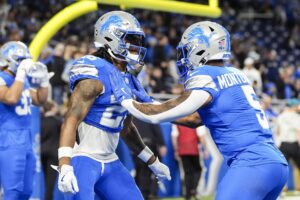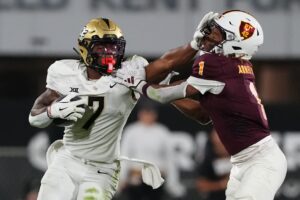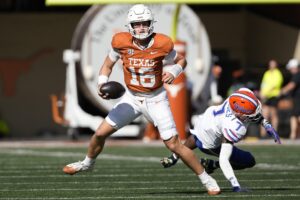Just two weeks into the 2018 season, the Josh Allen era is ready to begin with the Buffalo Bills. Depending on how one looks at it, that decision is coming too early or a week too late.
The Bills have little choice but to start Allen after Nathan Peterman quarterbacked an embarrassing offensive effort against the Baltimore Ravens last week. It took until the third quarter for the Bills to even earn a first down.
Week One overreactions are commonplace in the NFL, but the opening game was so bad for the Bills, it’s rather easy to argue the team botched its quarterback situation all summer. Now, they are in a lose-lose spot, where they must start the rookie.
Examining the Buffalo Bills Quarterback Situation
To understand how the Bills got to this lose-lose predicament, fans have to return to March when the team traded incumbent starter Tyrod Taylor.
The Bills made it very clear that Taylor was not in their long-term plans. Coach Sean McDermott tried to replace him with Peterman last November, but that resulted in Peterman throwing five interceptions in one half. Even still, the Bills parted ways with Taylor for multiple reasons.
First, the Cleveland Browns offered them the first pick of the third round. That compensation is hard to pass up for a player you don’t really want.
Secondly, trading Taylor meant the Bills would save $10.44 million in salary cap space for 2018. But what a lot of fans don’t detect with trades such as these is the associated dead-cap money.
Even when a team trades a player, their bonus money that was already paid to them remains on the team’s books. In the case of Taylor, he counts as $7.6 million towards the 2018 salary cap.
That’s just the beginning of the Bills dead-cap space problem. Traded players Marcell Dareus and Cordy Glenn combine to count for $23.16 million. Former center Eric Wood, who was forced to retire for health reasons, accounts for another $10.39 million in dead cap space.
The Bills led the league with a whopping $53.9 million in salary eaten up by players no longer on the roster. That’s twice as much as the Dallas Cowboys, who are second with $26.8 million in dead money.
Trading Taylor saved the Bills money, but with one-third of the salary cap going towards players no longer on the roster, there wasn’t enough funds for the Bills to fix their holes on the offensive line (they also lost Richie Incognito) or sign any playmaking wide receivers. Plus, the trade left a hole at quarterback.
The Bills Trade of A.J. McCarron
Days after trading Taylor, the Bills signed A.J. McCarron, who most projected would fill the quarterback hole. But then they dealt McCarron to the Oakland Raiders a week before the season.
Even in light of what’s happened, one could still justify the Taylor trade. He wasn’t the Bills’ future behind center, and taking the dead-cap hit in 2018 made sense because with all of the dead money falling on the 2018 salary cap, the Bills will be among the leaders in cap space next March.
But the Bills seemingly forgot an important detail – they still had to field a team for the 2018 season. Without McCarron, that meant starting either Peterman or Allen at quarterback.
Argument for Buffalo Bills Starting Nathan Peterman
Although he played well in the preseason, it’s hard to name any reasons to start Peterman. Mostly, the biggest reason he did start Week One was because Allen wasn’t deemed ready.
While the best way to learn is always firsthand experience, starting a young quarterback too early can backfire in the long term. It can shatter his confidence and shouldn’t be done if he isn’t in a position to succeed.
It’s hard to argue that he is in a spot to experience success with the Bills. Even though this team snapped its 17-year playoff drought last year, the changing offensive line and lack of talented wide receivers will make it difficult for any quarterback to move the ball let alone a rookie. LeSean McCoy is the only proven star on the Bills offense, and he didn’t have any room to operate in Week One with the Ravens stacking the box.
Heading into the season, the Bills likely knew they were going to suffer a setback, so there wasn’t really a need to rush Allen.
Argument for Buffalo Bills Starting Josh Allen
The only problem with that plan is Peterman isn’t an NFL quarterback. Again, he received little help from his offensive line, which allowed six sacks, or receivers, but last week, Peterman completed 5 of 18 passes for 24 yards and two interceptions.
In five games, he has completed 43.3 percent of his passes for an average of 4.1 yards per attempt, two touchdowns and seven interceptions.
That’s not acceptable, and it’s not as if Peterman’s incompetence should be surprising. He threw five interceptions in one half last year.
After last week’s dismal performance, McDermott couldn’t possibly sell starting Peterman again to his players or the Bills fanbase. If he did, he would be viewed as a joke, and with no other options, Allen must start.
This isn’t about getting or not getting “a look” at Peterman. The Bills never viewed him as their future – he’s strictly a placeholder until Allen is ready.
Teams will take placeholders like Josh McCown or Ryan Fitzpatrick. They’re veterans who, in the short-term, give teams a chance to win and will be a mentor to a young quarterback.
Peterman isn’t any of that. He can’t even keep the team competitive. So why not just start Allen and take the lumps of starting a rookie? If 2018 is truly already a lost season in Buffalo, the Bills could at the very least get Allen some valuable game experience.
It’s the only decision McDermott had left.






